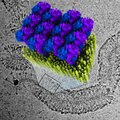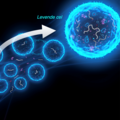Archive
13 December 2024
A new twist: the molecular machines that loop our chromosomes also twist DNA

Scientists from the Kavli Institute of Delft University of Technology and the IMP Vienna Biocenter discovered a new property of the molecular motors that shape our chromosomes. While six years ago they found that these so-called SMC motor proteins make long loops in our DNA, they now discovered that these motors also put significant twists into the loops that they form. These findings help us better understand the structure and function of our chromosomes. They also provide insight into how disruption of twisted DNA looping can affect health—for instance, in developmental diseases like ‘cohesinopathies’. The scientists published their findings in Science Advances.
11 October 2024
Delft scientists discover how innate immunity envelops bacteria

The protein GBP1 is a vital component of our body’s natural defence against pathogens. This substance fights against bacteria and parasites by enveloping them in a protein coat, but how the substance manages to do this has remained unknown until now. Researchers from Delft University of Technology have now unravelled how this protein operates. This new knowledge, published in Nature Structural & Molecular Biology, could aid in the development of medications and therapies for individuals with weakened immune systems.
10 October 2024
Natalia Vtyurina winner Marina van Damme Grant 2024

On Thursday 10 October, Delft University Fund organised the 2024 Marina van Damme Grant Award Ceremony. Three female Delft alumni stood the chance to win the coveted grant of € 9,000,-. After three impressive pitches and a short jury meeting, Prof. Marina van Geenhuizen, chair of the jury, announced that it was Natalia Vtyurina for winning the 2024 Marina van Damme Award!
04 September 2024
ERC Starting Grant for shedding light on neurodegenerative disease

Neurodegenerative diseases such as Huntington’s disease are incurable. These diseases are progressive brain disorders with severe effects on movement and mental functioning. How damage in the brain develops is far from understood however. Biophysicist Kristin Grußmayer has been awarded an ERC Starting Grant that enables her to search for causes by looking into brain cells and individual molecules.
22 August 2024
New SPARXS technique reveals DNA behaviour at unprecedented speed

Studying how single DNA molecules behave helps us to better understand genetic disorders and design better drugs. Until now however, examining DNA molecules one-by-one was a slow process. Biophysicists from Delft University of Technology and Leiden University developed a technique that speeds up screening of individual DNA molecules at least a thousand times.
18 July 2024
Margreet Docter SUTQ Educator

18 July 2024
SURF Education awards 2023

16 July 2024
Esengul Yildirim co-teach certificat

23 May 2024
Creating life from lifeless biomolecules with AI and lab evolution

“What is life? How does a living cell emerge from lifeless molecules?” wondered a multidisciplinary team of Dutch scientists. To answer these questions the research team, led by the TU Delft, aims to build a living synthetic cell from lifeless biomolecules, using laboratory evolution and artificial intelligence for the first time. The ten-year research programme to do so, entitled “Evolving life from non-life” or simply “EVOLF”, was awarded 40 million euro by the Dutch Research Council (NWO) as part of the Summit grants scheme.
16 May 2024
Gijsje Koenderink appointed as KNAW member

The Royal Netherlands Academy of Arts and Sciences (KNAW) has selected Gijsje Koenderink as new KNAW member. She will join the Academy together with 16 other leading scientists. The new members will be installed on 30 September 2024.